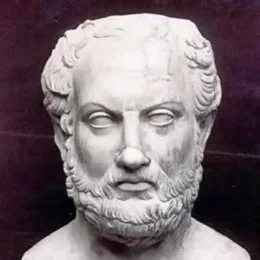An Interview with Spencer J. Quinn
Posted By Ondrej Mann On In North American New Right | Comments DisabledSpencer J. Quinn is one of Counter-Currents’ most prolific writers. I personally enjoy reading his articles on topics such as forgotten figures in history, music, and current political issues. In addition to writing articles, Spencer is the author of several books. His love of wisdom is evidenced by his avatar, Thucydides.
We spoke with this politically incorrect writer about racial consciousness, Counter-Currents, the future of White Nationalism, his favorite books, his innovations, Knut Hamsun, and the pick-up artist phenomenon.
Could you introduce yourself to the readers a bit more? You are one of the most-read authors on this site and hardly anyone knows you. For example, what are your Interests, education, hobbies, favorite books, humor?
I’ve been writing for Counter-Currents for a little over six years now. I am pseudonymous and live in the United States. Although I write essays and reviews for Counter-Currents, I consider myself a fiction author first and foremost. That is closest to my heart. Thus, I like most to read novels, but enjoy non-fiction nearly as much. I also enjoy music, movies, carpentry, and spending time with family. Of course, I also enjoy writing and doing research for my writing.
What is good to see in your place of residence? What do you like about it?
The best thing to see in my place of residence is my computer monitor when I am writing for Counter-Currents.
Are you worried about doxxing? Have any of your friends experienced doxxing? How did it go?
It is a concern. I do everything I can to prevent it from happening. I don’t know anyone personally who has been doxxed, fortunately.
What event or discovery led to your awakening of racial consciousness? When did it happen?
It started for me with race realism. I covered this in my 2020 essay “The Red-Pilling of Spencer Quinn.” [2] Here is an excerpt:
Then one day I watched carefully as a black custodian at my place of work was telling some of us a story. The man was good natured and quite animated, but not terribly bright or educated. His English, as typical with most poorly-educated blacks, was atrocious. It was as if his mind could not parse the complexities of the language rapidly enough to express himself properly in real time. So, in order to prevent his mind from having to operate more quickly than it was accustomed to, he pidginized the language to make it easier to pronounce. Entertaining as his story was, listening to him was a particularly ugly experience.
And then it hit me. He is not this way due to his environment or due to what happened to his ancestors in the past. These external factors could not possibly have impacted his language parsing abilities. White people simply do not have that much power, I remember thinking. The reason must be purely biological. This must be the phenotypic expression of the genes that this man was allotted at conception. He is who he is, and there is no one to blame for it.
For a number of years after this, I was mostly a conservative and neocon who kept his race realism on the down low. Mitt Romney losing in 2012 started my transition to white identity, since it revealed how tribalism will always dominate a multiracial society — and the only people not engaging in this tribalism were whites. Being exposed to Greg Johnson’s writings on Counter-Currents and reading Kevin MacDonald’s The Culture of Critique a few years later pretty much sealed the deal.
Why did you choose the Counter-Currents website for your writing? How did you discover this site?
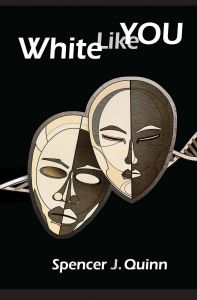 [3]
[3]You can buy Spencer Quinn’s novel White Like You here [4].
I discovered Counter-Currents in 2015 while doing research for my first novel, White Like You. The main character of the novel is a former libertarian, and when looking up articles viewing libertarianism from the Right, I encountered Greg Johnson’s essay, “The Refutation of Libertarianism.” [5] After this, I kept coming back to Counter-Currents because it had great content and was an edgy complement to American Renaissance, which I was also reading a lot of at the time.
After completing the novel, I figured that if I were to impress Greg enough with my essay-writing, he might consider publishing White Like You [6], so I wrote three essays and submitted them. Greg published two of them, and the rest is history.
You’re an experienced writer. You regularly rank on Counter-Currents’ list of most-read writers. What is the recipe for success? What would you recommend to young writers?
My only recipe is keeping track of my ideas and doing everything I can to keep my writing from being boring. My recommendation for young writers is to internalize The Elements of Style by Strunk and White and “Politics and the English Language [7]” by George Orwell, or other books like them. Also, know your audience. A bad writer who knows his audience will always be more successful than a good writer who doesn’t. There are a lot of essay ideas that I find intriguing, but I don’t pursue them because I don’t think my audience would care for them. The same is true of ideas for novels. When I began writing White Like You about a decade ago, I decided that the American Renaissance readership would be my audience. I wrote for them. One of my goals as a writer is to give comfort and entertainment to our people, and I am always gratified by positive responses to my essays in comment sections and on social media. This springs from my approach to writing.
Have you attended any metapolitical conferences? Is it a good idea to devote energy and money in this direction?
I have not attended any conferences. Maybe one day.
Do you think the younger generation is completely lost for White Nationalism? How can we influence the younger generation in our direction? I know you wrote a children’s book for this cause, My Mirror Tells a Story [8].
I have no idea. I believe that history will push enough of our people towards White Nationalism to eventually force a crisis in the West. I predict this will happen in the next 20 or 30 years. How we will emerge from that after the dust settles is anyone’s guess. The best we can do in the meantime is to write and act responsibly and have a tight-knit, fun, and productive community which demonstrates how natural and moral white identity and White Nationalism really is. The bigger and better that community is, the better our chances are of surviving the impending crisis.
Where is the post-Trump United States heading? Do we have a chance to influence that direction?
Tough question. I don’t know where the post-Trump US is heading. Some days I think we are headed further Left, other days further Right. Some days I see us moving towards the center, and others towards a breakup. Who knows? As for our chance to influence that direction, I think metapolitics is the way to go. We must change how people think about today’s society and reveal how corrupted it is by the lie of racial egalitarianism and our enemies’ anti-white tribalism. Slowly, we are making inroads into mainstream politics. We need to keep pushing and never give up. This way, our influence will only increase.
And what exactly can we do for that?
Of course, we keep doing what we already are doing by writing, having meet-ups and conferences, and putting content on the Internet. I think Patriotic Alternative is doing a great job. They do a mixture of real-life activism, video work, and writing. They show up to events or start their own. Another thing is to communicate with people close to but not quite in our milieu. This has been happening over the past few years. I call it the “Consolidation of the Right,” whereby the Dissident Right expands towards the center and absorbs people who, say, five years ago would not have been considered dissidents. Examples include Michelle Malkin, who spoke at the 2021 American Renaissance conference; Jim Goad joining Counter-Currents in 2020; the late Colin Flaherty developing a positive relationship with Jared Taylor in 2019; Laura Loomer recently having a great interview with Taylor at American Renaissance, and various mainstream politicians going on Gab. This is all the result of metapolitics, and we have to be relentless in converting such people to our cause.
Are there any projects in the US that you would recommend to pay attention to?
Counter-Currents and its policy institute [9]. Red State Secession [10]. The White Art Collective [11]. Gab. Richard Houck [12] and Glen Allen [13] are doing great work on the legal front for dissidents. I love that Peter Brimelow of VDARE recently purchased a castle. I know there’s controversy surrounding America First and the National Justice Party, but they do great work and are a huge improvement over the pre-Charlottesville Alt Right. And there’s always American Renaissance. There are probably others that I’m forgetting.
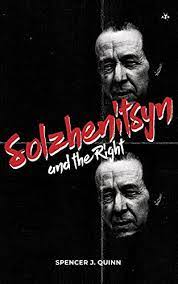 [14]
[14]You can buy Spencer J. Quinn’s Solzhenitsyn and the Right here [15].
You didn’t mention The White People’s Press. Do you know Tony Vermont personally? What’s your experience with that publisher?
Yes, I should have. (Sorry, Tony!) I have corresponded with Tony many times. He’s great to work with. He published my children’s book, My Mirror Tells a Story [8], and will soon publish my Young Adult novel The No College Club. Antelope Hill [16] also deserves a mention, since they published Solzhenitsyn and the Right [15]. They are a fantastic publisher as well and great to work with. American Zarathustra and Nullus Abnormocracy have likewise featured me on their YouTube channels to promote my work. They both have great content.
What kind of music do you listen to?
Classical and rock, mostly. Lately, it’s been Anonymous 4 for the former and Arcade Fire for the latter.
I see you’re an avid listener. Is it possible that we will read a music article from you as well?
I have written about music many times:
Don’t Want No Black Messiah [17]
Two Songs for the Alt Right [18]
White Nationalist Take On Rock & Roll [19]
Mozart Won’t Make You Smart (But Rap Will Make You Dumb) [20]
I’m Not Racist [21]
A Dissident Remembers Jim Croce [23]
The Soul of a Vincent ’52 [24]
Rediscovering a Song [25]
Four Classic Rock Songs for the Dissident Right [26]
Now Let Us Praise Great Jewish Violinists [27]
Constantinople (Not Istanbul) [28]
I have a few ideas for more music-related articles, which I might explore this summer.
You’re certainly an avid reader. Would you recommend your top five favorite books?
How about I give you ten? My top ten novels (alphabetical by author):
Père Goriot by Honoré de Balzac
The Plague by Albert Camus
The Secret Agent by Joseph Conrad
A Tale of Two Cities by Charles Dickens
The Possessed by Fyodor Dostoevsky
Growth of the Soil [30] by Knut Hamsun
Darkness at Noon by Arthur Koestler
Moby Dick by Herman Melville
Uhuru [31] by Robert Ruark
One Day in the Life of Ivan Denisovich by Aleksandr Solzhenitsyn
Here are my top ten nonfiction books (for dissidents):
The Uniqueness of Western Civilization by Ricardo Duchesne
The Neuroscience of Intelligence [32] by Richard Haier
Carnage and Culture [33] by Victor Davis Hanson
War Before Civilization [33] by Lawrence Keeley
The Conservative Mind by Russell Kirk
The Culture of Critique by Kevin MacDonald
The Bell Curve by Charles Murray and Richard Herrnstein
The Gulag Archipelago by Aleksandr Solzhenitsyn
200 Years Together [34] by Aleksandr Solzhenitsyn
A Troublesome Inheritance by Nicholas Wade
Could you introduce your own books to our readers?
White Like You [35] is a dystopian thriller about Ben Cameron who gets roped into joining the White Nationalist underground in the mid-twenty-first century, when America is being ruled by an alliance of Islam and the Left. He takes part in preparing for war while contending with treachery and fanaticism among his fellow insurgents, which threaten to derail the rebellion before it can even begin.
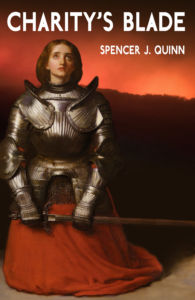 [36]
[36]You can buy Spencer J. Quinn’s novel Charity’s Blade here. [37]
Charity’s Blade [37] is another dystopian thriller from the mid-twenty-first century. This one takes place after a civil war, which has created an impoverished and besieged white ethnostate in the American West. Charity Keene must ferry her dying son through a war zone and ultimately to Eastern Europe where they have a possible cure the boy’s disease. In this war zone, however, she meets former enemies who can help her, but who also burden her with a dilemma she has to resolve before it’s too late.
Solzhenitsyn and the Right [15] is a collection of my Counter-Currents essays about Solzhenitsyn’s incalculable value to the Dissident Right. I cover From Under the Rubble, selections from The Red Wheel, his prison plays, Lenin in Zurich, Warning to the West, his Harvard address, Matryona’s House, 200 Years Together, and his memoirs.
My Mirror Tells a Story [8] is a rhyming book for small children about a little boy who discovers his identity as a white person after experiencing the negative effects of racial diversity in his school.
The No College Club (coming soon from The White People’s Press [38]!) is a Young Adult novel about four white high school students who, while researching a project on slavery, make a shocking discovery about the forgotten history of white servitude in Colonial America. They must now make a choice: Turn in a politically correct project on black slavery, or defy their anti-white teacher by focusing on white slavery, thereby taking the risk of being attacked as racists and possibly expelled.
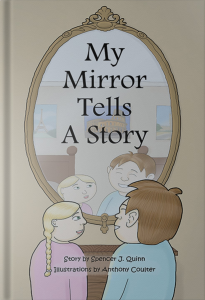 [39]
[39]You can buy Spencer J. Quinn’s My Mirror Tells a Story here. [8]
My Mirror Tells a Story is an innovation. There is a lot of subversive children’s literature out there, but a children’s book about positive perceptions of white identity — I’ve never come across anything like it before. Have you come up other innovations?
I have plenty of innovative ideas; it’s just that not all of them are good! I may try another children’s book in the future. At the moment, I am focused on writing essays and getting The No College Club published, hopefully in late summer.
Occasionally you write an article about an interesting but forgotten figure. Personally, I like this type of article. Do you have any more personalities like Hinton Rowan Helper and Bobby Fischer in your drawer?
Thank you! Yes, as a matter of fact I do have a few essays in the works about obscure figures from the past. But I want to surprise my readers, so I won’t give them away just yet.
You’ve written two reviews of books by Norwegian writer Knut Hamsun: Hunger and Growth of the Soil. These two are among my favorites by him. What do you admire about Knut Hamsun? Do we have a similarly talented writer on our side today?
I like how Hamsun has an inherent respect for the people, even when they’re behaving selfishly or pretentiously. Hunger and Growth of the Soil are the only two of his novels I have read, and they are so different that I cannot as of yet pinpoint very many similarities across his body of work. I plan to review one of his books each year in order to remedy this. Next up is The Women at the Pump.
One of your most-read articles was about marriage. How important is the institution of marriage to white survival? How do you view polygamy, polyamory, and same-sex marriage if these unusual models lead to increased white birth rates and quality parenting?
I believe you are talking about “On Dissidents and Marriage.” [40] I also have an essay on the benefits of arranged marriages called “The Nebbish and the Knockout.” [41] I think that the family is the irreducible building block of all great Western civilizations — and families cannot exist without marriage; that is, the legal union between one man and one woman. This is why the other forms of marriage that you mention should never be recognized by the state. If they were, they would then be competing with traditional marriage and making it less dominant. This can only lead to decline. I understand that a small percentage of people have a need for such alternative lifestyles and still can contribute to society, however. So, if such people are willing to live without legal recognition for their arrangements and with the stigma of being different, then I see no reason why we cannot tolerate them.
What’s your take on the pick-up artist (PUA) phenomenon? I like a lot of things about PUA and have even tried some of their strategies myself. White Nationalists should live and know more about life than regular normies, even in the area of seducing women.
Interesting question. I am not, nor have I ever been a pick-up artist. All I know about it is what I have read from Chateau Heartiste and Roosh V. While I don’t particularly care for Roosh, I find Heartiste witty and insightful. I also like Heartiste’s racial awareness and exclusivity. He writes explicitly for white men at a time when white men need this sort of attention. In a multiracial society, white men are at a serious disadvantage compared to non-white men: We have to compete with non-white men for white women, while at the same time non-white women on average are less desirable than white women. This means that the very presence of non-white men in our society reduces our chances of finding high-quality mates within our own race. Heartiste addresses this by teaching white men how to compete in such a fallen world. He’s like Machiavelli in that regard.
But there is a danger with the PUA movement. We cannot allow ourselves to have an antagonistic relationship with women. Men cannot view women merely as objects of desire or status symbols. Men should view women as equal partners in civilization-building. Yes, in a world without arranged marriages, we need to master what Heartiste calls “game” in order to acquire high-quality mates, but our goal should be to build families with women, not simply scoring with them.
* * *
Counter-Currents has extended special privileges to those who donate $120 or more per year.
- First, donor comments will appear immediately instead of waiting in a moderation queue. (People who abuse this privilege will lose it.)
- Second, donors will have immediate access to all Counter-Currents posts. Non-donors will find that one post a day, five posts a week will be behind a “paywall” and will be available to the general public after 30 days.
To get full access to all content behind the paywall, sign up here:
Paywall Gift Subscriptions
 [42]If you are already behind the paywall and want to share the benefits, Counter-Currents also offers paywall gift subscriptions. We need just five things from you:
[42]If you are already behind the paywall and want to share the benefits, Counter-Currents also offers paywall gift subscriptions. We need just five things from you:
- your payment
- the recipient’s name
- the recipient’s email address
- your name
- your email address
To register, just fill out this form and we will walk you through the payment and registration process. There are a number of different payment options.
